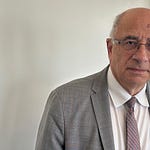The justice secretary Shabana Mahmood is planning a visit to Texas in the next couple of months to find out how the state has managed to reduce its prison population. As she told MPs last month, she believed this had resulted from “a system of good behaviour credits, where well-behaved prisoners could earn time off their sentence by engaging in rehabilitation programmes”.
But it’s not as simple as that. One reason for the high rates of imprisonment in the United States appears to be that so many suspects are denied due process, as it’s called in the US. It’s only when defendants win the right to a fair hearing that the rate of imprisonment goes down.
Defending Due Process is the title of a new book by Brandon Garrett, a professor of law at Duke University, North Carolina, and a former visiting fellow at All Souls. In his book, which is published in the UK this month, Garrett paints a disturbing picture of a system in which motorists lose their driving licences when they cannot afford to pay parking fines and then lose their liberty because they cannot raise the money to buy a bail bond. What’s left of due process is threatened, he says, by untested black-box AI technology.
In the latest episode of my podcast A Lawyer Talks, Garrett explains how Texas has managed to close so many of its prisons. But we began by discussing a pioneering nuclear physicist whose career came to an end when he was denied his right to due process — a miscarriage of justice he never lived to see put right:













